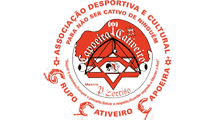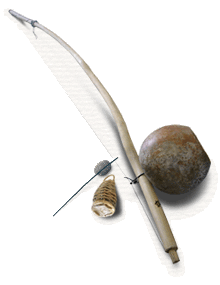History
Capoeira
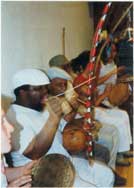
Capoeira is an athletic game based on a system of attack and defense, it´s off individual charadter and purely Brazilian origen. It was developed among Banto slaves, who were taden from Angola during the colonial time. Despite of severe prosecution until the first decades of the 20th century, it managed to survive the repression enlarged and became institutionalized as a regulated sport.
Few cultivate this art, in which teh poetry of mevement and the body´s “ginga give the impression, that those, who practice it are feathers dancing to the berimbau´s rhytm.
When it comes to a fight, the capoeirista becomes the most intimidationg rival, like a cat, he runs, hides, goes forth and back, all this in a very calmed, strong and decided way. He becomes a dreature that can´t be grabbed nor touched, a fluid, a lightening that appears and quickly disappears again.
All his force resides in this elastic capacity, in front of shich the enemy gets frightened and astonisched, hesitates and fears.
Nowadays, Capoiera has changed a lot its image but through its in mentary (which inspires peace and spiritual harmony combined with an aspekt of struggle) it has kept the lessons left ba those woh rebelled against slavery and every form of opression.
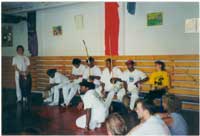 In the “roda” (circle of people, in which Capoiera ist played) there is no place for prejudice aund vanity, in it opposites meet (doctor and illiterate, bleck and white, child and adult, man and woman, strong and weak,etc.) and a man ist judged for his art.
In the “roda” (circle of people, in which Capoiera ist played) there is no place for prejudice aund vanity, in it opposites meet (doctor and illiterate, bleck and white, child and adult, man and woman, strong and weak,etc.) and a man ist judged for his art.
In Capoiera there is no eisy nor impossible task and the capoeirista is a creative and decided warrior who loves life and freedom.
Being a capoierista is more than learning how to fight well, it is necessary, to understand the characteristics of this art and its origins, historical and social.
What is the baptism (Batisado)?
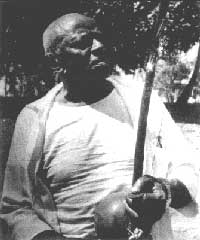 It was Mestre Bimba, with his love for new theings, who invented the Batizado, which in portuguese means baptism. What a wisdom! Originally in the Capoiera Regional (as taught by Mestre Bimba) the new student was “baptized” when he entered the “roda” to play for the first time. A more experienced student, the “godfather” guided his first steps in the “roda” and used to give him a nickname (“nome de guerra”) by wich he would be called ba the other capoeiristas. The “batizado was kind of an initiaion ritual.
It was Mestre Bimba, with his love for new theings, who invented the Batizado, which in portuguese means baptism. What a wisdom! Originally in the Capoiera Regional (as taught by Mestre Bimba) the new student was “baptized” when he entered the “roda” to play for the first time. A more experienced student, the “godfather” guided his first steps in the “roda” and used to give him a nickname (“nome de guerra”) by wich he would be called ba the other capoeiristas. The “batizado was kind of an initiaion ritual.
With the time the “Batizado” became a ceremony in capoeira, it became an event that was celebrated by the academies, even in Angola academies.
Mestre Bobó (RIP) who was an angoleiro of tradition, used to justify the adaption of the “batizado”, saying, that the “batizado” was one of the good things, Mestre Bimba geve to the Capoeira. “Good things dan be copied.”
In a book, wrote by Decânio, who was a pupil of Mestre Bimba since 1939 called “The legacy of Mestre Bimba”
You can find the following apart about this matter. ” the first lesson taught withe the berimbau, had the special name of “batizado”, where the most elderly pupil, already baptized calls the already developed student
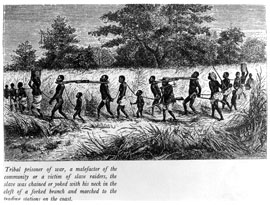 The “batizado” had also the special character, to continue the studies and symbol of a new base.
The “batizado” had also the special character, to continue the studies and symbol of a new base.
To enter the “roda” for the first time is not an artificial myth. Mestre bimba, as well as the old Mestres used to valorize the “roda” as a preciouw fountain of learning, that´s why in his academy every lesson ended with a “roda”.
Gibing the batizado another sense, Decânio says, that in Mestre Bimba´s academy the group of pupils was very diverse, etnically as well as socialy (blacks, whites, rich, poor, dictors. illiterates) and that because of thes Bimba used to create ways to ficilitate the creation of friendship among his students an dso he encentivated games of sociability, psicologically in order to make personal relationships destroy prejudices. (this is one of our group´s main objectives).
The importance of Capoeira
One of the reasons, that keeps a nation alive is the preservation of its culture. It´s the reason tho keep a life in unity with its social and historical personalitys.
Capoiera is part of our culture. Schi is fight, dance, and espression of body, is sport and finally technique. This means, that she , as an practicated sport has to worry about the fundamental nessecity of a child and the pysical, psychical and cultural nessecity of an adult. And with this it should serve the education in general.
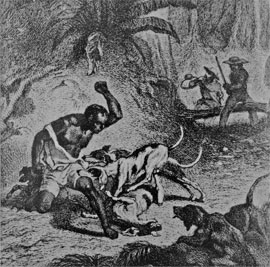 Capoier finds it´s historical, social and aultural roots in the life of the brazilian nation itself, sending a message of love to Brasil. It´s expression is based on flexibility, balance, ability, which develops during training the techniques and the exercises an the movements of dancing, to the rythm which appears spontanously from inner side to outside. Capoiera leads the person to confidence mildness, diziplin anc character. The joy to play capoeira means rebirth.
Capoier finds it´s historical, social and aultural roots in the life of the brazilian nation itself, sending a message of love to Brasil. It´s expression is based on flexibility, balance, ability, which develops during training the techniques and the exercises an the movements of dancing, to the rythm which appears spontanously from inner side to outside. Capoiera leads the person to confidence mildness, diziplin anc character. The joy to play capoeira means rebirth.
Because of the fact that capoeira is part of the liberation of our nation, it is importantthat the work with capoiera has a fundamental base, keeping the roots an its oigign an our national identity. Because of capoeira is a real brazilian sport.
We from the grupo cativeiro are concious about the fact, to preservate the real roots of Capoeira.
Obviously nowadays time changed, but preservating the right balance we can proove that we as Capoeiristas , as messengers of thes culture, fundamental Afro-Brazilian, have the responsibility in a time, where there are lots of bad teatchers to freservate the freedom of Capoiera as modern habitants of the Quilombos. Not only spreading Capoiera in social privileged classes, but also there. Preservating the technical neveau and not only the social , like somaones do. Like bringing elements of other fights, whicht brings no evvicience and beauty to capoeira.
As true symbols and Ideals never dies, w are not afraid, to speak about ZUMBI and to be sure that our Quilombo will be known in different “mocambos” and people will talk about it´s disapearence long time after us.
Capoiera, which grew from the longing of the human being for freedom the highest and never dieing value, will wurvive poorness and mediocrity, that prevents us to unificate and to use our arms for cultural liberation.
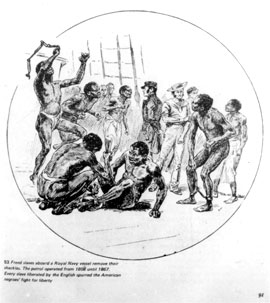
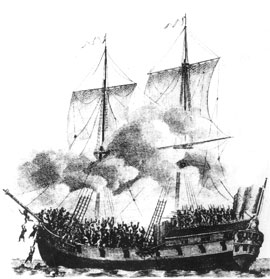
![]()
